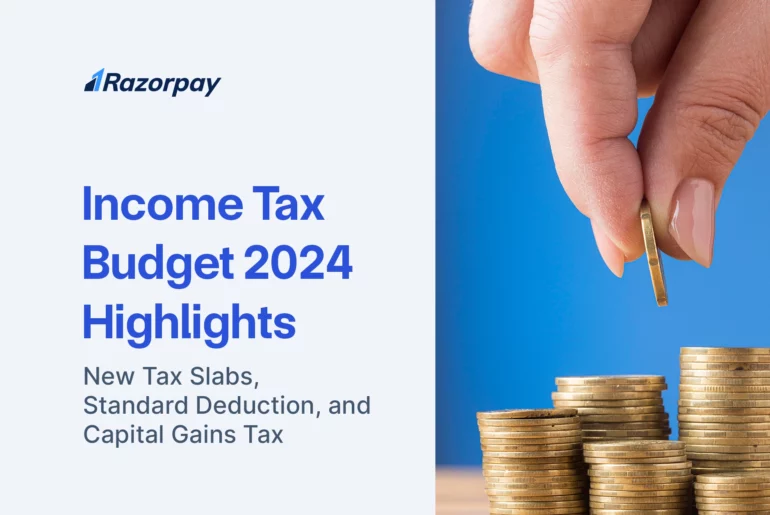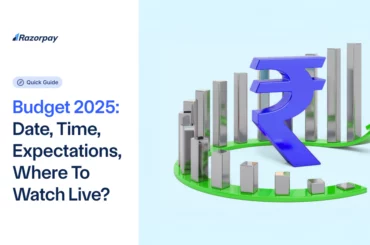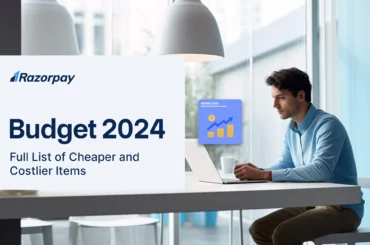Finance Minister Nirmala Sitharaman unveiled the Union Budget 2024-25 today, addressing the high expectations of taxpayers and salaried employees. The Union Budget 2024 has brought forth substantial reforms in the income tax framework, reflecting the government’s commitment to ease the tax burden on citizens and stimulate economic growth. These measures are anticipated to invigorate the economy by simplifying the tax filing process, increasing consumer spending, and attracting investments.
Table of Contents
Key Updates on Income Tax in Union Budget 2024
Revised Tax Slabs for FY 2024-25:
- The new tax regime introduces updated income tax slabs to offer greater benefits to individual taxpayers.
- The basic exemption limit has been increased from ₹3 lakh to ₹5 lakh under the new regime, providing significant relief to low and middle-income earners.
Increased Standard Deduction:
- The standard deduction for salaried individuals and pensioners has been increased, allowing them to claim a higher deduction and reduce their taxable income.
- This increase aims to boost disposable income and enhance consumer spending.
Capital Gains Tax Adjustments:
- Changes to the capital gains tax regime have been introduced to simplify the taxation of gains from the sale of assets.
- These adjustments are expected to create a more transparent and investor-friendly environment, encouraging more investments.
Focus on Middle-Income Earners:
- The government has targeted individuals with annual earnings between ₹5 lakh and ₹15 lakh, who are currently taxed at rates ranging from 5% to 20%.
- These measures are designed to alleviate the tax burden on the middle class, stimulating private consumption, which is crucial for economic growth.
Fiscal Deficit and Welfare Spending:
- While introducing tax cuts, the government continues to focus on reducing the fiscal deficit.
- There is also an emphasis on increasing welfare spending to address the needs of various stakeholders, ensuring a balanced approach to fiscal policy.
Also Read: Budget 2025 Key Expectations and Highlights
New Income Tax Slab in Budget 2024-25
Finance Minister Nirmala Sitharaman introduced revised income tax slabs aimed at providing substantial relief to taxpayers and simplifying the tax structure. Below are the new income tax slabs:
| Annual Income Range (₹) | Tax Rate (%) |
| Up to 3,00,000 | Nil |
| 3,00,000 – 7,00,000 | 5% |
| 7,00,000 – 10,00,000 | 10% |
| 10,00,000 – 12,00,000 | 15% |
| 12,00,000 – 15,00,000 | 20% |
| Above 15,00,000 | 30% |
Old Vs. New Tax Regime, What’s the difference?
| Income Range | Proposed Tax | Current Tax |
| Up to ₹3 Lakhs | Nil | Nil |
| ₹3 Lakhs – ₹7 Lakhs | 5% of exceeding ₹3 Lakhs | 5% of exceeding ₹3 Lakhs |
| ₹7 Lakhs – ₹10 Lakhs | ₹20,000 + 10% of exceeding ₹7 Lakhs | ₹15,000 + 10% of exceeding ₹6,00,000 |
| ₹10 Lakhs – ₹12 Lakhs | ₹50,000 + 15% of exceeding ₹10 Lakhs | ₹45,000 + 15% of exceeding ₹9 Lakhs |
| ₹12 Lakhs – ₹15 Lakhs | ₹80,000 + 20% of exceeding ₹12 Lakhs | ₹90,000 + 20% of exceeding ₹12 Lakhs |
| Above ₹15 Lakhs | ₹1,40,000 + 30% of exceeding ₹15 Lakhs | ₹1,50,000 + 30% of exceeding ₹15 Lakhs |
Standard Deduction to Increase to Rs. 75,000
In a significant relief for salaried individuals and pensioners, Ms. Sitharaman announced an increase in the standard deduction from ₹50,000 to ₹75,000 as part of the Union Budget 2024. This move aims to enhance disposable income and stimulate consumer spending, which is crucial for economic growth. The increased standard deduction will allow taxpayers to reduce their taxable income by a larger amount, providing greater financial relief.
Simplification of Capital Gains Tax
In a bid to streamline the taxation of capital gains, the Union Budget 2024 introduces significant changes to the capital gains tax regime. The exemption limit for capital gains has been increased to ₹1.25 lakh, providing greater relief to investors. Additionally, the tax rate for short-term capital gains (STCG) has been revised to a flat 20%, while long-term capital gains (LTCG) on certain assets have been adjusted to 12.5%. These reforms are aimed at simplifying the tax process and enhancing transparency for investors.
Frequently Asked Questions (FAQs)
What is the new standard deduction limit announced in the budget?
The new standard deduction limit announced in the Union Budget 2024 has been increased from ₹50,000 to ₹75,000. This adjustment applies to both salaried individuals and pensioners.
How will the increased standard deduction benefit taxpayers?
The increased standard deduction will allow taxpayers to reduce their taxable income by a larger amount, resulting in lower tax liability and increased disposable income. This change is designed to provide financial relief and boost consumer spending.
Should I switch to the new tax regime now?
Whether to switch to the new tax regime depends on your individual financial situation. The new regime offers revised tax slabs and potentially lower tax rates, but it may come with the loss of certain exemptions and deductions. It is advisable to compare your tax liability under both regimes or consult a tax advisor to determine the best option for you.
What should investors know about the capital gains tax changes?
The Union Budget 2024 has introduced several changes to the capital gains tax regime. The exemption limit for capital gains has been raised to ₹1.25 lakh. The tax rate for short-term capital gains (STCG) has been set at a flat 20%, while long-term capital gains (LTCG) on certain assets are now taxed at 12.5%. These changes aim to simplify the tax process and make the investment environment more favorable.




